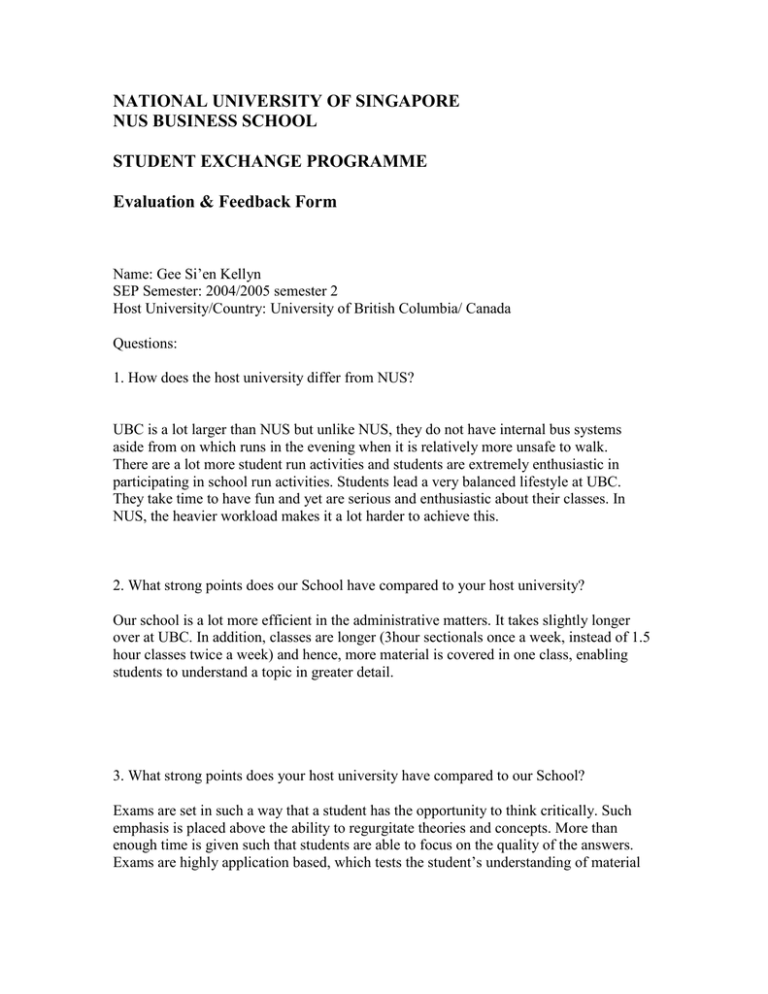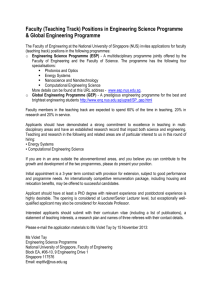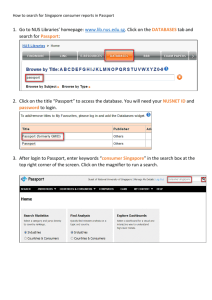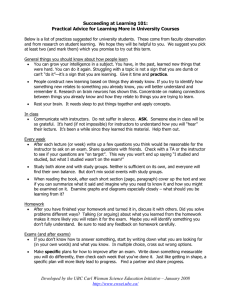University of British Columbia, Canada S2 04/05 - Gee Si-en Kellyn
advertisement

NATIONAL UNIVERSITY OF SINGAPORE NUS BUSINESS SCHOOL STUDENT EXCHANGE PROGRAMME Evaluation & Feedback Form Name: Gee Si’en Kellyn SEP Semester: 2004/2005 semester 2 Host University/Country: University of British Columbia/ Canada Questions: 1. How does the host university differ from NUS? UBC is a lot larger than NUS but unlike NUS, they do not have internal bus systems aside from on which runs in the evening when it is relatively more unsafe to walk. There are a lot more student run activities and students are extremely enthusiastic in participating in school run activities. Students lead a very balanced lifestyle at UBC. They take time to have fun and yet are serious and enthusiastic about their classes. In NUS, the heavier workload makes it a lot harder to achieve this. 2. What strong points does our School have compared to your host university? Our school is a lot more efficient in the administrative matters. It takes slightly longer over at UBC. In addition, classes are longer (3hour sectionals once a week, instead of 1.5 hour classes twice a week) and hence, more material is covered in one class, enabling students to understand a topic in greater detail. 3. What strong points does your host university have compared to our School? Exams are set in such a way that a student has the opportunity to think critically. Such emphasis is placed above the ability to regurgitate theories and concepts. More than enough time is given such that students are able to focus on the quality of the answers. Exams are highly application based, which tests the student’s understanding of material taught rather than the ability to memorize. Even in an exam setting, students have the avenue to be creative in their answers and are often rewarded for it. 4. What expenses did you incur at the host university for one semester? Estimated Breakdown of Expenses: Items Airfare (Return Ticket) Travel & Health Insurance Accommodation Food Books & Stationery Clothing Miscellaneous (Eg: Local transportation, phone calls, postage, student visa, medical report) Others (Eg. Extended stay, airfare for tour of neighbouring states/countries, etc) Please specify here: Total Estimated Expenditure (S$) 2500 250 3000 2800 420 1000 250 1000 11220 5. Please type a THREE to FIVE page report of your personal experience in the host university. a) Your overall experience overseas (initial cultural shocks that you encountered, lifestyle, about the university, academic aspects) b) What you learned from the exchange program c) Your advice and suggestions for future exchange students designated to go to that university Exchange Report My overall experience overseas Going on exchange in semester 2 gave me less time to be emotionally and mentally prepared. Shortly after my exams, I found myself in a very different environment, with a drastic change in climate. Hence, change was very much in order. It took me some time to get a feel of the Canadian culture. Something that I discovered very quickly was that people in Canada are extremely vocal and are not afraid to make their views and opinions heard. Such was the case in class where students showed great enthusiasm to answer questions posed by the lecturer. It was a small culture shock for me, because in Singapore, most students shy away from answering questions. It took me sometime to appreciate that class can be so much more enjoyable when students participate more. This was the case during group discussions which were highly interactive as every person in the group contributed their thoughts and opinions freely. People in general are cordial and friendly, especially in the shopping stores. Salespeople greet you warmly when you walk in, but initially, I did not know how to react. As time went by, I got used to this way of life, such that conversations with salespeople became normal. It was nice to be in a friendly environment, although at times, I would doubt if there was any sincerity in such greetings. Nevertheless, I feel that it is a good practice that Singaporeans should learn to adopt. Having stayed in campus, I had the opportunity to observe the general lifestyles of students there. Most students know the importance of having a good time, even in school. It was common to see students go for a movie on a weekday at the campus cinema, even when it’s the exam week. However, they also studied hard. Most students lead a very balanced lifestyle, in other words, they party hard, but when it is time to study, they are able to discipline themselves to do so. Something that I will always remember is an event held on the last day of school called the Arts County Fair. Students would purchase tickets and gather in the school Thunderbird stadium where many different bands would played loud music, alcohol was sold and students went crazy. This would be normal if it was after the exams, but the last day of school also happens to be one week before the big final exams. Most people would discipline themselves to study hard right after the arts county fair. As I was on exchange, while there were assignments to do and readings to complete, I made it my priority to have the time of my life there. Therefore, most of my time was spent visiting new places, trying out new food at different eating places and getting to know different people. It was a very favorable lifestyle, as I got to see and experience sights that I would never have been able to enjoy in Singapore. Life was almost stressfree and hence extremely enjoyable. UBC is huge, and initially, it was difficult to find my way around. But gradually, I got used to the different landmarks and it was easy. What I learnt The most valuable thing I learnt was to not be afraid to speak up. Immersed in an environment where everyone was excited to give their two cents worth, I found myself speaking more in class. It did not matter if what I said was wrong or was not agreed on by other people. I learnt that the contribution of different views only served to enrich my academic life there. Honestly, it had always been a challenge to enjoy school in Singapore. My perspective had always been largely on attaining good grades and hence, such a chase made it hard to truly enjoy studying. However, this exchange helped me to realize that if I were to change my perspective, try to appreciate what I was studying and maintain an open and enthusiastic view, then life would not be as stressful. In addition, I learnt to be adaptable in a different culture. By doing so, I was able to appreciate another way of life, try my hand at living like a Canadian and learn more about their culture. It is in the Canadian culture to take very good care of the elderly and disabled. The disabled are not despised upon but instead, treated exceptionally well. The public transportation system is specially tailored to accommodate them and through this, I learnt to value and love such people more. Advice and suggestions Since it may be difficult to find your way around the university as it is huge, make sure u get hold of a university map. With the map, which is very detailed, moving around shouldn’t be a problem. With regards to staying on campus, if you want a place that is nearest to the business school, the best places to stay at are Place Vanier residence (which is excellent) or Walter Gage residences. Vanier is dorm-style where you get your own room and the bathroom is shared on every level. The meal plan is compulsory, and compared to the other dorms, the food here is known as the best. You can’t expect to find good Chinese food here, but there is a sandwich bar as well as a grill where they make your burgers fresh. On the other hand, at Gage, you share an apartment with 3 or 4 other students. The bathroom is shared for each apartment as well. Judging from the apartments that I had visited, most are usually very dirty, since you can’t really control your roommates’ mess. However, you are in a closer proximity to your roommates and it may facilitate making friends. It is also much nearer to the bus loops (bus interchange) which travels out of UBC to all other places. Location wise, gage is the best but the downside is, there is no meal plan and no residence cafeteria, which means that you have to do your own cooking: which can be a joy or a pain, depending on your preferences. Food is Vancouver is awesome, provided you know where to go. For value for money and good sashimi and sushi, go to samurai sushi on Davie Street which is downtown. If you want to try Greek food, the best is just a few shops down samurai sushi. It’s called Stepho’s. Be prepared to queue up for it though. Another must try is Guu, an authentic Japanese eatery on Thurlow Street and Robson, a few shops down Banana Republic. Order the kim chee fried Rice. Its heavenly! If you like Gelato, go to Mondo gelato on Robson. Try the cranberry muesli flavor. It was my favorite and I believe you can’t find it in Singapore. Shopping is not bad in Vancouver, but my personal favorite is Metrotown shopping centre. Its huge! To get there, just take the skytrain and stop at Metrotown station. There are 2 supermarkets there which are the cheapest among the others. You can find almost every kind of Chinese foodstuff at TNT while the western one is the great Canadian superstore. For cheap stuff, do visit the dollar stores. They often have things that would cost so much more if you buy them at a regular store. The one at metrotown is not bad. Another thing, if you are going in winter, remember to bring enough warm clothes. Don’t bother bringing long johns because they are ugly and uncomfortable. No one wears them there and even though I brought many sets I didn’t wear them at all. If you must, one set should be more than enough. The weather is so cold that you hardly perspire there. To keep warm, layer your clothes. Don’t forget your gloves and scarves too. They will save you from the blistering cold. Do invest in good quality clothing that will really keep you warm. All in all, go there with an open mind and remember to enjoy yourself! School is much easier there so don’t worry too much about not being able to pass!




